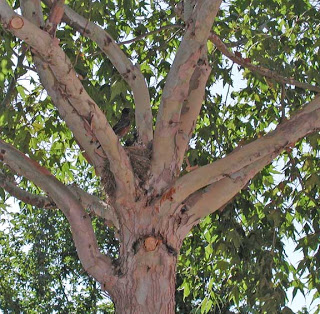Archive for the ‘The Green Collar Economy’ Category
Thoughts for a Thursday

We were standing by our car in Sedona, when I saw a robin hop along the ground with green stuff in her beak. She watched us for a minute of so, and then flew up into the tree. If you look at the center of this tree, you will see momma, her nest, and her babies. It was a wonderful moment with nature.
Speaking of nature, I am reading a really amazing book by Van Jones, called The Green Collar Economy. He is the founder and president of Green for All. You can’t get to his personal website any longer, since he is now a Special Advisor on the economy for President Obama.
Early on he talks about the environmental movements, starting with the respect the Native Americans paid to the land and then touching on Silent Spring by Rachel Carson. I read Carson’s book when I was a sophomore in high school. We needed to write a review as an assignment. I just recently came across the paper – I heavily criticized the book, on the basis that our government would not condone the actions and destruction she was documenting. I was extremely naive at the time and have since been supremely disillusioned. But I guess deep down I still retained some of the naivete.
Johns really hits the racism within our environmental problems. I guess if I paid attention more – and had a lens other than a white middle class one – I would have seen this. Hurricane Katrina – who got left behind? The poor and the people of color, who didn’t have the resources to be able to flee the clity. Here’s one excerpt:
“The world stared in disbelief. The truth slowly sank in. The citizens of that once proud city had been left to the tender mercies of what could only be called a ‘free market’ evacuation plan. Everyone who owned a functioning car (and who had a working credit card) was perfectly able to flee. But those who didn’t own private vehicles, those who didn’t have credit cards or savings accounts, whose who were two days shy of a payday that might have let them buy a full tank of gas were left to face the flood waters, alone….the reality was painfully simple: an awful flood had come, and the United States had left behind its poor, its black, its disabled, its infirm – to ‘sink or swim.'” (p. 69)
That is pretty harsh. And you wonder what it has to do with Jones’ premise for a green-collar economy to fix the environment and the economy. He goes on to point out in his chapter on eco-equity:
“As we move into this age of ecological challenge and opportunity, our first principle must be ‘Equal protection for all.’ This ideal is key because, in an ecological crisis, those individuals, families, and communities without money and status will always be hit first – and worst. When the floodwaters rise, fires rage, droughts parch, or superdiseases attack, the most marginal cannot afford to get out of harm’s way. They cannot afford to protect themselves. And still worse, once the crisis has passed, they are least able to bounce back, to rebuild, to recover. Therefore, as dangers multiply, we must revive – as a cornerstone commitment in our national life – the deep principle of equal protection.” (p. 66)
Very strong stuff to read and internalize. Yet he is very positive about grassroots movements in building a green economy. So – just a few thoughts. We all share this planet, regardless of our political or religious views. We ALL need to become involved in a green future.